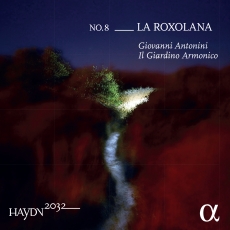Giovanni Antonini & Il Giardino Armonico - Haydn 2032, Vol. 8: La Roxolana - Gramophone
Which way will they turn next? Giovanni Antonini and his Italian periodinstrument band here present an early, a middle and a late-ish symphony, along with their most surprising contextualising work so far, a set of Romanian folk dances by Bartók, plus a little anonymous sonata. Working to a performance schedule rather than a rehearse-record one gives this evolving cycle a noticeable edge over so many others. String coordination, as throughout the series, is pinpoint accurate, woodwinds plump-sounding and characterful, and horns gloriously wild. The quicksilver string passages that give the Mercury its name glint like light off a sabre, as does the bariolage in the Minuet of No 28. The Roxelane Symphony (so-called in the Philharmonia score and elsewhere but here rendered La Roxolana) is presented in its second version, with additional flute and an alternative finale.
The Bartók doesn’t jar in the slightest: the language may be different but the blood that flows through it is audibly of a similar ethnicity: Haydn after all spent much of his life tucked away in a distinctly Slavic corner of the Austro-Hungarian Empire. Antonini himself plays not only a Baroque transverse flute but also a chalumeau – that missing link between the recorder and the clarinet.
The real revelation here, though, is Symphony No 28. It rarely gets an airing outside completist projects such as this – and when it does it often comes over rather flaccidly, almost as if the musicians feel they must apologise for its not being the London Symphony. It’s easy to look back and see these early symphonies as steps on the path to later greatness but they work best when considered on their own terms. When treated with the virtuosity and seriousness of purpose as here, a work such as No 28 is revealed as every bit as entertaining and finely wrought as those later masterpieces.


